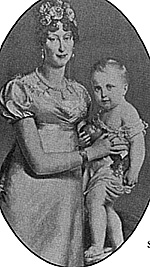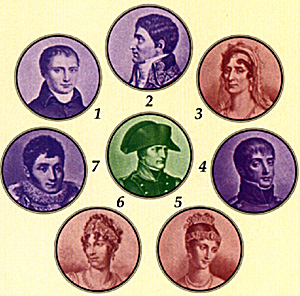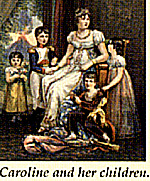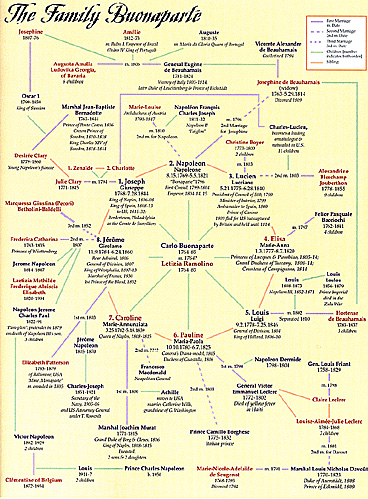
Napoleon Obtains an Heir
Empress Josephine was unable to conceive an heir, and, reluctantly, Napoleon divorced her at the end of 1809. (He gave her their mansion at Malmaison and a substantial retirement income.) A political marriage was arranged with the Emperor of Austria for his daughter Marie-Louise, who was also the great-niece of executed French queen Marie Antoinette. Marshal Berthier stood as Napoleon's proxy for the marriage ceremony in Vienna on 11 March 1810. Despite the impersonal expediency of this union, Napoleon fell in love with his "little German" and she learned to love the man that she had previously despised for defeating her country in four separate wars. To his great delight, Marie-Louise produced a son in 1811, Francois Charles Joseph Bonaparte, Napoleon II and King of Rome. The Emperor adored his son, called "The Eaglet," but to Napoleon's great chagrin he was not permitted to communicate with him during his exile on St. Helena. Francois died of tuberculosis at the age of 21.
Napoleon's Siblings
1. Joseph (7 Jan. 1768 - 28 Jul. 1844)
Napoleon's older brother Joseph received his law degree from Pisa, Italy and rose in Corsican political circles before Paoli's revolt and the family's flight in 1793. The following year he married Julie Clary. Her sister Desiree was once betrothed to Napoleon, but would marry Marshal Bernadotte. Julie bore Joseph two daughters, both of whom would marry sons of Napoleon's brothers.
Joseph served as an aide, legislator, and diplomat, followed Napoleon to Italy in 1796, won election to the Council of Five Hundred in 1797, and then served as Ambassador to Parma and Rome. He supported Napoleon's Brumaire coup d'etat in 1799, and then further demonstrated his diplomatic talents by becoming France's chief negotiator of the Concordate (1801) and the treaties of Luneville (1801) and Amiens (1802).
 Although Joseph's principles led him to oppose his brother's establishment of empire, in return for which Napoleon dubbed him "Prince Egalite", he acquiesced. Having refused the offer of the crown of Italy in 1805, he was given command of the army in Naples in 1806, and received its crown from Napoleon shortly thereafter. His two-year rule was marked by reform, the abolishment of feudal institutions, improvement of education, adoption of a constitution, and modernization of the economy. Only with reluctance did he abdicate his throne to his brother-in-law Marshal Murat, at Napoleon's insistence, to become King of Spain in 1808.
Although Joseph's principles led him to oppose his brother's establishment of empire, in return for which Napoleon dubbed him "Prince Egalite", he acquiesced. Having refused the offer of the crown of Italy in 1805, he was given command of the army in Naples in 1806, and received its crown from Napoleon shortly thereafter. His two-year rule was marked by reform, the abolishment of feudal institutions, improvement of education, adoption of a constitution, and modernization of the economy. Only with reluctance did he abdicate his throne to his brother-in-law Marshal Murat, at Napoleon's insistence, to become King of Spain in 1808.
His enlightened rule had little chance of success amid the maelstrom of Spain's resistance, fueled by Britain's arms, money, and active army, bickering marshals, and his brother's long-range meddling. He tried on several occasions to give up the throne, refused each time by Napoleon, only to lose it finally with his defeat to Wellington at Vitoria in 1813.
Napoleon nevertheless turned to Joseph to head the government in Paris in 1814, and to command its National Guard as the Emperor tried to fend off the final Allied onslaught against France. Joseph loyally served Napoleon in 1815 when his brother attempted to regain the throne of France. After the Hundred Days, he sought refuge in the United States for seventeen years and lived out his last three years in Italy, dying in Florence. A charming and talented man, Joseph is mostly remembered for his failure to surmount the impossible task of governing a rebellious Spain.
2. Lucien (21 May 1775 - 29 Jun 1840)
The most independent-minded of Napoleon's siblings, Lucien married an innkeeper's daughter, Christine Boyer, against his family's objections, only to be widowed six years later.
A fervent Jacobin, Lucien was president of the Council of Five Hundred and played a crucial role in the success of the coup of Brumaire in 1799 when Napoleon seized power. Lucien had hoped to save the Republic and suffered remorse for having contributed so directly to its demise. He was made Minister of the Interior and then Ambassador to Spain, in which role he argued with Napoleon and left government service.
He remarried in 1803, again over family objections, to "a lady of uncertain reputation," and moved to Rome. Napoleon demanded his divorce and offered Lucien the crown of Italy if he agreed. With the annexation of the Papal States in 1809, Lucien and his family tried to flee to the United States, but were intercepted by the Royal Navy. He was hospitably interned in England until 1814, where he was watched, but not imprisoned.
He hurried to Napoleon's side in 1815, and was central to arranging the unsuccessful proclamation of Napoleon's son in lieu of the Emperor's second and final abdication. Thereafter, Lucien retired to Italy, dying at Viterbo. He was the only one of Napoleon's siblings to refuse all honors and to receive no imperial titles.
3. Elisa, called Marie-Anne (3 Jan 1777 - 7 Aug 1820)
Elisa attended the ancien regime's most exclusive girl's school, St. Cyr, and in 1797 married a Corsican noble, Felix Pascal Bacciochi. She and her husband received suitable imperial honors, becoming rulers of two small Italian principalities. Estranged from her husband shortly thereafter, Elisa received the bestowal from Napoleon of the new Grand Duchy of Tuscany after its annexation to France in 1809.
An intelligent and enlightened ruler, her city of Florence became a magnet for the intellectual elite, and a Tuscan dictionary was produced which contributed to standardizing the Italian language. After Napoleon's downfall, she reconciled with her wealthy husband and retired to Bologna and then Trieste, outside of which she died, at nearby Santa Andrea.
4. Louis (2 Sep 1778 - 25 Jul 1846)
An artilleryman like his older brother, Louis followed a soldier's career. He accompanied Napoleon on his Italian campaign (1796-97) as an aide, and sailed with him to Malta and Egypt (1798). At Napoleon's behest, he married Hortense de Beauharnais, daughter of Napoleon's wife, Josephine. Although an ill-starred marriage, their third son was to rule France as Napoleon III in 1852.
In 1805, Louis took command of the troops in Holland, and then in 1806 was given that country's crown by his imperial brother. He led the Dutch army in defense against the British 1809 expedition against Walcheren and then came into conflict with Napoleon over the welfare of his new subjects.
A conscientious ruler, he promoted Dutch national interests, improving flood control, organizing a national health program, defending religious freedom and rights, while refusing to institute conscription. But the most serious collision with Napoleon came as a result of failing to enforce the Continental System embargo against Britain and suffer economic damage.
In 1810, Napoleon sent in troops to force Louis' abdication. Louis sought asylum in Austrian Bohemia, and returned to France in 1813, but his offer of service was ignored by Napoleon. Louis passed the Hundred Days in Rome, where mother Bonaparte resided, and finally died in Livorno (Leghorn), Italy.
5. Pauline, called Marie-Paulette (10 Oct 1780 - 25 June 1825)
The most beautiful of Napoleon's sisters, witty and compassionate, Pauline is said to have lacked the family's ambition. Napoleon married her to General Victor Emmanuel Leclerc in 1798, who left her a widow at the age of 22 after his death from yellow fever in Haiti in 1802, the former French colony he was attempting to reconquer. She married an Italian prince, Camillo Borghese, in 1804, but soon separated.
Perhaps her most famous exploit was posing for Antonio Canova's nude sculpture, "Venus Reclining," in 1805, reveling in the ensuing scandal. Napoleon gave his favorite but flirtatious sister the Italian Duchy of Gustalla in 1806, although she passed most of her time in Paris, the only other Bonaparte to enjoy Josephine's company. She did not get on well with the new Empress, Marie-Louise, and in 1810 she withdrew to her duchy -- which she lost with her brother's abdication in 1814. Still loyal to Napoleon, she visited him in exile on Elba later that year, retired to Italy in 1815, and died in Florence.
 6. Caroline, called Marie-Annonciade (25 Mar 1782 - 18 May 1839)
6. Caroline, called Marie-Annonciade (25 Mar 1782 - 18 May 1839)
Described as "ambitious, amoral, and intelligent, as well as pretty," Caroline was married to General (later, Marshal) Joachim Murat, Napoleon's famous cavalry commander. She shared with Murat his elevation to the Grand Duchy of Berg, and then, later, the crown of Naples -- which was jointly held, as she persuaded Napoleon to make her co-ruler against the possibility of Murat's death in battle.
Caroline became popular with her new subjects. She schemed actively to promote her interests: trying to have Murat named as Napoleon's successor while Napoleon was fighting in Spain; opposing Napoleon's marriage to Marie-Louise; finally, in 1814, she persuaded Murat to save their kingdom by betraying Napoleon and joining the Allies.
Murat was conscience-stricken, and could not be dissuaded from attacking the Allies in 1815, seeking to launch a campaign to rally and unify Italy. With his defeat went their crown: Caroline and her children surrendered to Austria while Murat escaped to offer his sword to Napoleon during the remainder of the Hundred Days. The Emperor rebuffed him. Murat then launched a pitiful attempt to recover his throne, and in a sad finale to his resplendent career, he was captured and shot. Caroline later married a Neapolitan General, Francesco Macdonald, living in Austria and then Italy, eventually dying in Florence.
7. Jerome (9 Nov 1784 - 24 Jun 1860)
The youngest of the Bonaparte siblings, Jerome had an undisciplined side. He was only fifteen when he became a member of the Consular Guard in 1800. His wounding in a duel led to his transfer to the navy the same year -- the only Bonaparte to serve at sea. Without permission, Jerome went ashore in the United States where he met and, in December 1803, married 18-year-old Elizabeth Patterson, daughter of a Baltimore millionaire.
In 1805, Napoleon compelled Jerome to return by severing his income, but his wife was barred from entering the empire. She debarked in Britain to give birth to their son, and eventually returned to the U.S. The Pope refused Napoleon's demand to annul the marriage so the archbishop of Paris dissolved the bonds, freeing Napoleon to marry Jerome to Catherine of Wurttemberg in 1807.
In the 1806 campaign against Prussia, Jerome now served his brother on land, eventually commanding a Bavarian corps. Napoleon proclaimed him King of Westphalia in July 1807, a realm created from various German principalities. Although Goethe described the notorious parties of Jerome's court as "a Roman circus," Jerome abolished serfdom and feudal institutions, and reformed the judicial and educational systems.
In the 1809 campaign against Austria, Jerome commanded the 10th Corps. Against Russia, in 1812, he was made responsible for the right wing of the Grande Armee. His poor performance, however, earned him his elder brother's wrath, and, refusing to serve under Marshal Davout, Jerome returned home.
He rallied to Napoleon in 1815, took command of a division, and fought at both Quatre Bras and Waterloo.
Jerome and his wife took refuge with his father-in-law, the King of Wurttemberg, in the wake of Napoleon's final abdication. In 1847 he was finally allowed to return to France, eventually to die at Massy. Jerome's great-great-grandson, Prince Charles Napoleon recently ran for mayor of Ajaccio, Corsica where the Napoleonic saga began.

More Napoleon: Introductory Guide
-
Introduction
Prejudice and Pride
Napoleon in Military School
The Young Artillerist's Double Life
Revolution & Opportunity
Women's Fashion During the Revolution
The Siege of Toulon
Napoleon & Josephine
Women's Fashion during the Directory
Fame & Glory: Italy
Fame & Glory: Egypt
Saviour or Usurper
Battle of Marengo
Civil Achievments
Enlightened Despot or Tyrant
Napoleon's Siblings
The Dawn of Gastronomy
Haydn and Beethoven
Women's Fashion during the Empire
Napoleon's Other Women
The Mashalate and Imperial Eagle
History's Greatest General?
Back to Table of Contents -- Napoleon #17
Back to Napoleon List of Issues
Back to MagWeb Master Magazine List
© Copyright 2001 by Napoleon LLC.
This article appears in MagWeb (Magazine Web) on the Internet World Wide Web.
The full text and graphics from other military history magazines and gaming magazines are available at http://www.magweb.com
Order Napoleon magazine direct